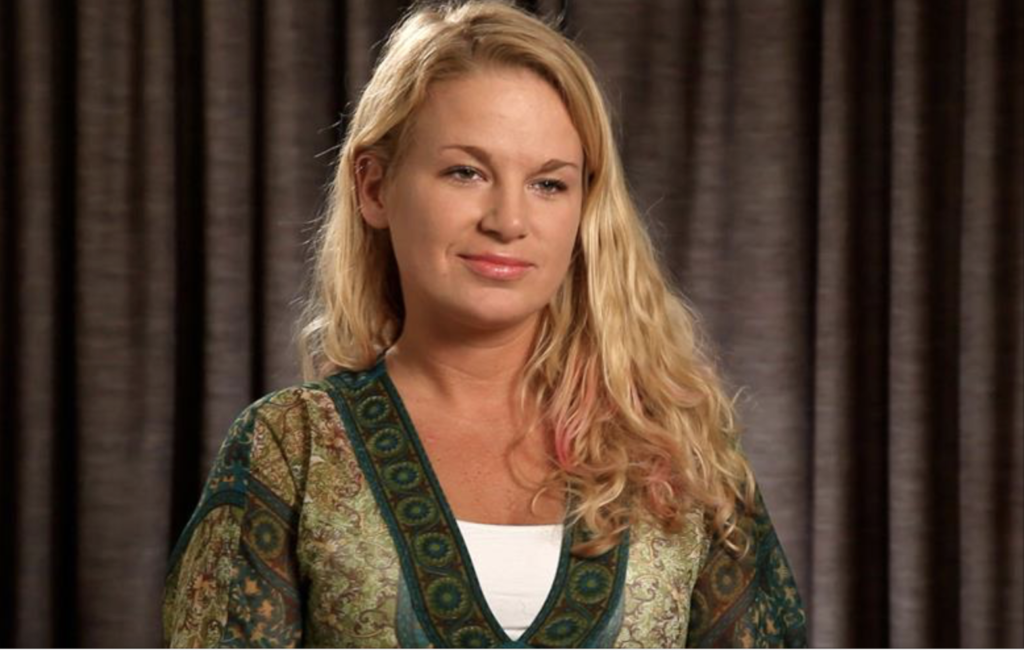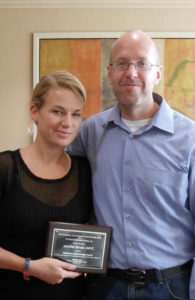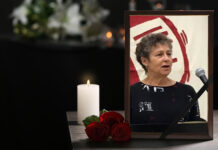Editor’s note: Michael Gilbert contributed to this remembrance of Jennifer Kinzie, who died on February 22.
***
Jennifer Kinzie was a woman full of hope. I say that delicately, reverently, and, even in the light of her recent death, I say it as defiantly as Ms. Kinzie might say it herself, were she able to do so.
But alas, she is not. Jennifer Lynn Kinzie passed away suddenly last week in Virginia.
Streetwise and sincere, Kinzie was a licensed mental health counselor who truly was a person of lived experience. She was diagnosed as “bipolar” as a teenager, and like so many from her generation, she was medicated. After suffering the debilitating effects of diagnosis and drugs, Jennifer used this personal experience in order to guide her work — not only as a counselor and therapist, but also as a volunteer with numerous psychiatric survivor groups.

Ms. Kinzie worked with the kind of clients few of her peers wanted to engage with: the delinquent, troubled teens, who were often placed before her by a court order. Her clients were usually poverty stricken and angry, young people who had already been prescribed multiple psychotropic drugs before their teen years. They were destined to be “lifers” in the “mental health system; that is, unless they were headed to jail — or “rehabilitated” instead.
Nonetheless, Jennifer Kinzie began each session with a new client in the same way. “Write down your diagnoses,” she’d simply say. The youngster would pick up the pen and typically list the 4 or 5 conditions ascribed to them by their psychiatrist.
Kinzie would read the list and then — in dramatic fashion — rip up the paper in front of the teenager.
“That list?” she’d say firmly, “that’s not you. Don’t come in here and tell me that you’re ‘bipolar’ or ‘ADHD.’
“What’s your name? Where are you from? THAT is who you are.” When asked why she departed from many of the norms of the Psychiatric Guild, Kinzie was characteristically direct: “I don’t use the language of symptomatology. Their labels don’t mean anything in my office — and I will not advance the very ideas that are helping to incapacitate them.”
Ms. Kinzie’s unconventional ways won her the respect of hundreds of parents, teachers, counselors and yes, teenagers too. “I don’t judge them,” she once said after a conference in Syracuse. “I don’t push my values on them. We discover what their values are and help them to become congruent with them. Because ultimately, that’s what will help lead them forward in life.”
Jennifer first worked in a group home with children who were described as having “developmental disabilities.” It was a time, she said, “when I had completely bought into the notion of psychiatric drugging and conventional attitudes about treatment. There was so much poly-pharmacy: kids taking Zoloft AND Paxil; Seroquel AND Risperdal. But I completely bought these ideas because that’s how I was trained.”
It wouldn’t be long before she began challenging the expected standards of Psychiatry, and it frequently surfaced when Kinzie took a stand on behalf of a client. The first instance she recalled was when a parent phoned her to ask if she would accompany them to a meeting with her son’s psychiatrist. The mother told her, “He won’t look at me and he won’t listen to me,” she said. “He doesn’t respect me.”
Jennifer soon discovered that the psychiatrist’s attitude extended to her as well. “He kept looking at me like, ‘What are YOU doing here?’ And I realized, ‘Hell, I’m just a lowly master’s level counselor.’ I’m not to be taken seriously — nor should I be, in their eyes.” Whether the attitudes were fueled by feelings of academic supremacy, sexism, paternalism, or blatant disrespect, Kinzie ignored the slights and privately told the MD that her client was not doing well — and was suffering dark side effects from the drug he’d been prescribed.
The psychiatrist’s answer was to increase the dose of the antidepressant to its highest legal limit — and Jennifer never forgot what happened that day. It steeled her resolve, and she vowed to help her clients on a person-to-person basis. “I look at the constructs behind the delivery of so-called mental health treatments and I am appalled at what I allowed myself to believe after my initial training,” she shared years later. “If we’re speaking about people in terms of ‘disability and deficits,’ then that’s how people will think of themselves. We teach vulnerable people to succumb to the idea that they’re not normal, productive members of society; that they’re disabled. So, how can they do any better? Be any better?”
It’s that logic and idealism that led many to her doorstep, most recently to her own practice in Virginia, where she continued to be unrelenting in the fight for those who often didn’t have a voice. One young man approached Kinzie and asked her to write a letter on his behalf so he could collect disability payments. She tried and tried — but simply could not complete the letter. “I don’t feel you are disabled,” she finally told the young man. “I believe you can do anything you choose to do. You might just need a little extra help with that.”
The young man looked at his counselor “with a sense of relief,” Kinzie recalled. Years later, “he’s at a different place in his life. He’s doing very well. So if I sold him out, I would’ve been just one more person telling him that he was damaged beyond repair. And I just couldn’t do that.”

Her experiences within the system helped her connect in a way that most professionals are unable to achieve. Her spirit and purpose were infectious, and parents and young clients shared similar stories about working with this extraordinary woman. “They’d say, Jen, you’re real. . .the first real person we’ve ever dealt with. You don’t talk down to us and you give us hope.”
Yes, Jennifer Kinzie was a beacon of hope for those who needed it most. The stakes were high and often meant life or death; freedom or jail time; a lifetime of agony or a shot at peace.
“I can have empathy for those who don’t understand the dangers of these drugs and other accepted protocols. Because I didn’t get it either,” she said in 2014. “But every day I look into the eyes of a young person and see the spark come back; every time I witness them coming off the heavy-duty psychiatric drugs that truly were disabling them — it’s exhilarating.”
Jennifer is survived by her beloved children, Orchid and Shawnery Kinzie, whom she adored and nurtured. She was only 42 years old.
____
Jennifer Kinzie, LMHC, graduated from SUNY Oswego in December 2001 with a B.A. in Psychology. In December 2005, she received her master’s degree in Community Counseling and Human Services (SUNY Oswego). She was a Licensed Mental Health Counselor as well as a certified Clinical Trauma Professional and certified facilitator for the Alternatives to Violence Project (AVP). Jennifer spent 20 years (Oswego NY, Syracuse NY, Virginia) working in a variety of roles in the mental health field, such as Peer Specialist, Care Coordinator, Program Manager, Case Manager, and Clinical Supervisor. Ms. Kinzie was a visiting adjunct instructor at Cazenovia College from 2012-2016.
In June 2019, she opened her own practice, Inspiring Lotus Healing Sanctuary, LLC.
She was a member of ISEPP Inc., a long-time volunteer for and supporter of It’s About Childhood & Family Inc., and appeared in the film, Letters from Generation Rx.














Please share and consider support
https://gofund.me/38f9a7b5
Report comment
Sad that she passed, maybe even sadder that someone like this is so unique that they need to be written about this way (shouldn’t all counselors be like this?).
Report comment
Indeed. Thank you for commenting.
Report comment
“Whether the attitudes were fueled by feelings of academic supremacy, sexism, paternalism, or blatant disrespect,” …. Definitely, these are all – too often – personal problems of the psychiatrists. Not to mention the psychiatrists’ ignorance of the common adverse effects of the drugs, in which they claim to be “experts” at prescribing.
Thank you, Kevin, for sharing Jennifer’s good works. Forty two is the age when I escaped psychiatry, initially. I always knew 42 was my lucky number, but didn’t know why, until I was 42. I’m so sorry Jennifer died so young.
My condolences to you, all her clients, and to her family and loved ones, on everyone’s loss. Am I allowed to ask whether her untimely death, was likely caused by the psychiatric malpractice, in her youth?
Nonetheless, many thanks to you, Kevin, for your exposure of psychiatry’s harms of our children. Thankfully, I was able to keep the psychiatrists away from my children – since the psychologists, psychiatrists, and social workers attacked me first, instead of my very young children.
But I’ve met lots of younger people, who were attacked by psychiatry – who know psychiatry’s crimes against our children, and humanity – need to be exposed, and ended. Thanks for all you do, Kevin. And again, my condolences to all.
And I absolutely agree, “It’s About Childhood & Family.” It’s about love, not the fear and hate mongering, the psychiatrists’, and their “elite” are pushing.
Report comment
Thank you for sharing part of your story and for your kind thoughts about Jennifer. It would seem that 42 is your lucky number – and I think all who read this are so grateful for your good health. It’s inspiring – and dare I say your recovery provides the kind of hope that Jen embodied. Peace and continued wellness to you and your family.
Report comment
“…the heavy-duty psychiatric drugs that truly were disabling them…” – Is 100 percent true.
“But every day I look into the eyes of a young person and see the spark come back; every time I witness them coming off the heavy-duty psychiatric drugs that truly were disabling them — it’s exhilarating.”
Report comment
Jennifer was such a dear heart and incredibly dedicated soul on her great path to help people in need.
I had always hoped she could work out the timing to attend one of our Nurtured Heart intensive training weeks and despite nudging from Michael Gilbert and myself, that was never in the cards.
When Michael sent me Kevin’s beautiful tribute to Jennifer earlier today I reposted it to our trainer community with a note that I am awarding her that certification. She exemplified the true nature of nurturing.
Report comment
What a wonderful act, Howard. I’m sure that Jen’s family will be proud to add that to Jen’s bevy of professional and personal accomplishments. I know that she admired you and your work immensely. Blessings to you.
Report comment
I am devastated to hear this. Jennifer was such a special person. It is a huge loss, both personal and for the world. And for Orchid and Shawnery. My heart goes out to them.
Report comment
Thank you Kevin and Michael for this wonderful tribute, and
I my sincere condolences to you both, family and the people who she
shared with.
I am glad that she touched people’s lives in a positive way.
Report comment
This is very sad news and a great loss for humanity. My deepest condolences to Jennifer’s family, colleagues and friends. Thank you Kevin Miller and Dr. Gilbert for this heartfelt tribute to Jennifer Kinzie and all the genuine caring and support she provided for so many.
Report comment
Sadness! Jennifer was a warrior and she will not be forgotten.
Report comment
The only reason I wasn’t misdiagnosed with bipolar or one of the schizophrenia’s is that after my mother died, I saw a psychologist who had heard of spiritual crisis. She didn’t really understand it – who does, unless it be those who’ve been through it and even *then* it’s pretty gobsmackingly weird to imagine that at one time I truly believed myself to be Eve and the Chosen One, here on Earth to bring about world peace – but when she listened to my story, she sent me down a path of research that lead to Jung, Assagioli, transpersonal psychology etc. If I’d not travelled that path, I would have been taking my meds every day for the past 30-odd years of my life. Every day, I give thanks for Jocelyn Clayton, who was my Jennifer Kinzie. I find it criminal that so many others aren’t so lucky and that people’s lives are continually ruined by arrogant, wilfully ignorant fools in power.
Report comment